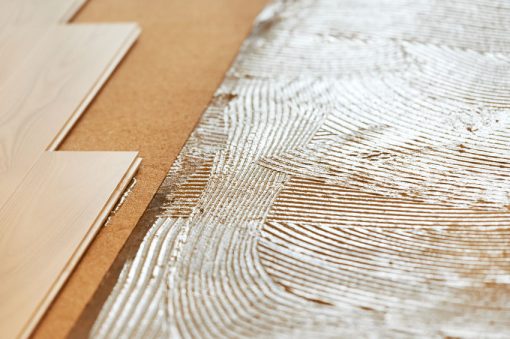Choosing Between DIY and Professional Flooring Installation
Are you considering installing new flooring in your home but unsure whether to tackle it yourself or hire a professional? The decision between DIY and professional flooring installation can be a challenging one, as both options have their pros and cons. In this article, we will help you make the right choice for your situation.
If you’re a handy person and enjoy taking on home improvement projects, DIY flooring installation might be right up your alley. Not only can it save you money, but it can also give you a sense of accomplishment and pride. However, keep in mind that installing flooring requires precision and expertise, especially for complex materials like hardwood or tile.
On the other hand, hiring a professional flooring installer ensures a high-quality finish and eliminates the need for you to do the work. Professionals have the necessary skills and experience to handle any challenges that may arise during installation. Although it may cost more upfront, it can save you time and potential headaches in the long run.
Ultimately, the decision between DIY and professional flooring installation depends on your abilities, budget, and tolerance for risk. Consider these factors carefully before making a final decision.
DIY flooring installation tips and tricks
Embarking on a DIY flooring installation project can be an exciting and rewarding experience, but it’s essential to approach it with the right knowledge and preparation. One of the key tips for successful DIY flooring installation is to thoroughly research the specific type of flooring you’re working with. Different materials, such as hardwood, laminate, or tile, have unique installation requirements and techniques. Take the time to familiarize yourself with the manufacturer’s instructions and watch tutorial videos to ensure you understand the process step-by-step.
Another crucial tip is to properly prepare the subfloor before laying the new flooring. This may involve leveling the surface, removing any existing flooring, or addressing any subfloor issues. Attention to detail at this stage can make a significant difference in the final outcome of your project. Additionally, ensure you have all the necessary tools and materials on hand before starting the installation. This will help you avoid delays and frustration during the process.
Finally, patience and attention to detail are paramount when tackling a DIY flooring installation. Take your time, work methodically, and don’t be afraid to ask for help or seek guidance from experts if you encounter any challenges. By following these tips and tricks, you can increase your chances of achieving a professional-looking and long-lasting flooring installation.
Pros and cons of DIY flooring installation
Choosing to tackle a DIY flooring installation project can have both advantages and disadvantages. On the positive side, DIY installation can save you a significant amount of money compared to hiring a professional. By doing the work yourself, you eliminate the labor costs associated with professional installation, which can be a significant portion of the overall project budget. This can be especially appealing for homeowners on a tight budget or those who enjoy the satisfaction of completing a home improvement task themselves.
Another advantage of DIY flooring installation is the sense of accomplishment and pride that comes with successfully completing the project. Many homeowners find the process of installing their own flooring to be a rewarding and empowering experience. It can also give you a deeper understanding and appreciation for the work involved in maintaining and improving your home.
However, there are also some drawbacks to consider when opting for a DIY flooring installation. Lack of experience and expertise can lead to mistakes or subpar results, which can ultimately cost more in the long run to fix or redo. Flooring installation, particularly for complex materials like hardwood or tile, requires precision and attention to detail to ensure a professional-looking finish. If you’re not confident in your abilities or don’t have the necessary tools and equipment, the risk of making costly errors increases. Additionally, DIY installation can be physically demanding and time-consuming, which may not be feasible for some homeowners.
Common mistakes to avoid in DIY flooring installation
One of the most common mistakes in DIY flooring installation is failing to properly prepare the subfloor. Ensuring the subfloor is clean, level, and free of any irregularities is crucial for achieving a smooth, even finish. Neglecting this step can lead to issues like uneven surfaces, gaps, or even premature wear and tear of the new flooring.
Another mistake to avoid is not accurately measuring the space and ordering the correct amount of flooring materials. Underestimating the required quantity can result in running out of materials mid-project, causing delays and potentially requiring additional purchases. Conversely, overestimating can lead to wasted materials and unnecessary expenses. Carefully measuring the room dimensions and factoring in any waste or cuts is essential for a successful DIY flooring installation.
Failing to properly acclimate the flooring materials to the installation environment is another common pitfall. Many types of flooring, such as hardwood or laminate, require a period of acclimation to the temperature and humidity levels of the room before installation. Skipping this step can lead to issues like warping, cupping, or gapping in the finished floor. Taking the time to allow the materials to adjust to the space can help prevent these problems and ensure a long-lasting installation.
Factors to consider before deciding on DIY installation
Before deciding to tackle a DIY flooring installation, it’s essential to carefully consider several key factors. One of the most important considerations is your level of experience and expertise with home improvement projects. If you have prior experience with flooring installation or are a skilled DIYer, you may be well-equipped to handle the project on your own. However, if you’re a novice or lack the necessary skills, it may be more prudent to hire a professional to ensure a high-quality and long-lasting installation.
Another crucial factor to consider is the complexity of the flooring material you’re working with. Some types of flooring, such as hardwood or tile, require a higher level of technical expertise and specialized tools to install correctly. Attempting to install these more complex materials without the proper knowledge and equipment can lead to costly mistakes and unsatisfactory results. In such cases, it may be wiser to enlist the services of a professional flooring installer.
The size and layout of the space you’re working with is also an important factor to weigh. Larger or more intricate rooms may pose additional challenges for a DIY installation, such as the need for precise cutting and fitting. If you’re not confident in your ability to handle these complexities, it’s generally better to hire a professional who has the experience and resources to tackle the project efficiently.
Benefits of professional flooring installation
Hiring a professional flooring installer can offer numerous benefits that may outweigh the potential cost savings of a DIY approach. One of the primary advantages is the assurance of a high-quality, long-lasting installation. Professional installers have the necessary skills, experience, and access to specialized tools to ensure that the flooring is laid correctly, with attention to detail and precision. This can help prevent common issues like uneven surfaces, gaps, or premature wear and tear, ultimately extending the lifespan of your new flooring.
Another significant benefit of professional installation is the time and hassle it can save you. Flooring projects can be physically demanding and time-consuming, especially for larger or more complex spaces. Hiring a professional team allows you to avoid the time-consuming and labor-intensive aspects of the installation process, freeing up your schedule to focus on other priorities. Professional installers also have the expertise to handle any challenges that may arise during the project, minimizing the risk of delays or unexpected complications.
Additionally, professional flooring installers often have access to a wider range of high-quality materials and specialized techniques that may not be available to the average DIYer. This can result in a more polished, visually appealing final product that seamlessly integrates with the overall design of your home. The peace of mind and confidence that comes with a professional installation can be invaluable, especially for homeowners who want to ensure a flawless and long-lasting flooring solution.
Hiring a professional flooring installer – what to look for
When it comes to hiring a professional flooring installer, it’s essential to do your due diligence to ensure you’re working with a reputable and qualified contractor. One of the first things to look for is proper licensing and insurance coverage. A licensed and insured flooring installer will have the necessary credentials to operate legally and provide protection in case of any accidents or damages during the installation process.
It’s also important to ask for references and check the contractor’s track record of successful projects. Reach out to past clients to get a sense of the installer’s work quality, professionalism, and customer service. Additionally, look for reviews and ratings from reliable sources, such as the Better Business Bureau or online review platforms, to get a well-rounded understanding of the contractor’s reputation.
Another crucial factor to consider is the level of experience the flooring installer has. Look for a contractor who has extensive experience working with the specific type of flooring material you’re installing, as this expertise can make a significant difference in the final outcome. Ask about the installer’s training, certifications, and the number of years they’ve been in the business to gauge their level of expertise.
When to hire a professional for flooring installation
While DIY flooring installation can be a rewarding and cost-effective option for some homeowners, there are certain situations where it may be more prudent to hire a professional. One such scenario is when the flooring material is particularly complex or requires specialized skills and equipment. For example, installing hardwood, tile, or natural stone flooring often necessitates a higher level of expertise and attention to detail that may be beyond the capabilities of the average DIYer.
Another instance where hiring a professional may be the better choice is when the project involves a large or intricate space. Larger rooms or homes with challenging layouts, such as multiple floors or oddly shaped spaces, can present additional installation challenges that a professional installer is better equipped to handle. They have the experience and resources to navigate these complexities and ensure a seamless, high-quality finish.
Additionally, if you’re working with a tight timeline or have limited physical abilities, hiring a professional flooring installer can be the more practical option. Professional teams have the manpower and efficiency to complete the job in a timely manner, freeing up your time and energy for other priorities. This can be especially beneficial for homeowners who may struggle with the physical demands of a DIY installation.
Conclusion: Making the right choice for your flooring installation needs
When it comes to choosing between DIY and professional flooring installation, there is no one-size-fits-all answer. The decision ultimately depends on a variety of factors, including your level of experience, the complexity of the flooring material, the size and layout of the space, and your personal preferences and constraints.
If you’re a skilled DIYer with experience in home improvement projects and are working with a relatively straightforward flooring material, a DIY installation can be a cost-effective and rewarding option. However, if you’re dealing with complex flooring types, a large or intricate space, or have limited time or physical abilities, hiring a professional flooring installer may be the wiser choice.
Regardless of which path you choose, it’s essential to carefully weigh the pros and cons, consider the potential risks and benefits, and make an informed decision that aligns with your specific needs and goals. By taking the time to research, plan, and make the right choice, you can ensure a successful and satisfying flooring installation that enhances the beauty and value of your home for years to come.

